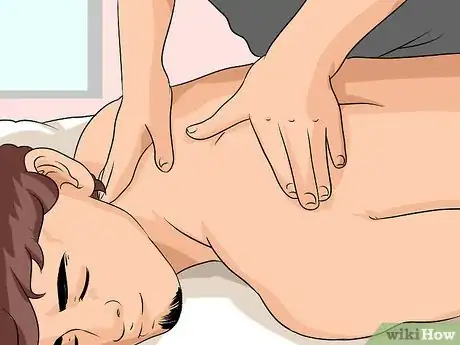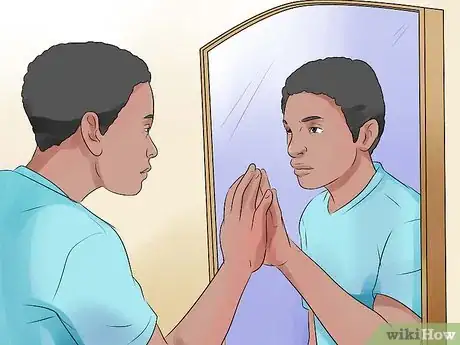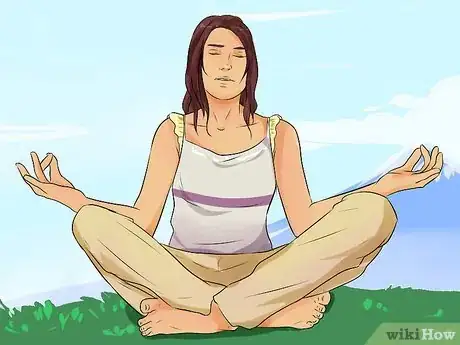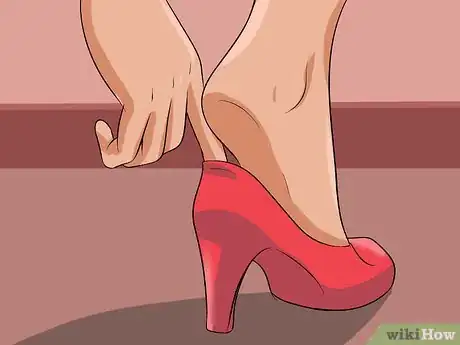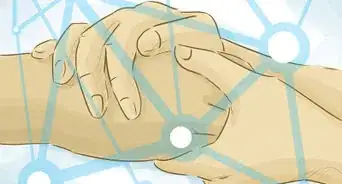This article was co-authored by Trudi Griffin, LPC, MS. Trudi Griffin is a Licensed Professional Counselor in Wisconsin specializing in Addictions and Mental Health. She provides therapy to people who struggle with addictions, mental health, and trauma in community health settings and private practice. She received her MS in Clinical Mental Health Counseling from Marquette University in 2011.
There are 21 references cited in this article, which can be found at the bottom of the page.
This article has been viewed 31,913 times.
We, as humans, often find ourselves making the effort to take care of others, like our children, spouse, friends, parents, grandparents, and so on. Yet we rarely take the time to be good to ourselves. Taking care of ourselves is essential to living a long, happy, and healthy life. There are many things, big and small, that we can do for ourselves on a regular basis to relax, recharge, reflect, and reevaluate.
Steps
Taking Care of Yourself Every Day
-
1Take a 10-minute time out. If something is overwhelming you, or you feel like you’re being pulled in ten directions at once, take a time out. Stop doing whatever is stressing you out and do something enjoyable. Take a short walk, listen to a favorite song, read a chapter in a book, or whatever else makes you happy.[1]
-
2Learn to say no. There is no human requirement that says we must always say yes when others ask us to do something, even if we love and care about the person. And you’re not being selfish telling someone no. [4] If you have too many things on your plate any one day, don’t allow yourself to add more.
- Focus on your priorities — Review all the things you have on your plate and evaluate if any new things you’ve been asked to do fit with your top priorities or are more important. If the things you’ve been asked to do are a low priority in your life right now, it’s probably a good idea to say no. If your friend asks if you can help him with his resume today, but you're taking your dad to the hospital for some tests, you can say, "You know, I really can't today."
- Be realistic — Think realistically about what you can accomplish in a given day. Not only that, but what can you accomplish effectively? Maybe you can tackle 20 tasks in a day, but will you be able to do them well? Maybe adding one or two more things into the mix will hurt the quality of all your tasks for that day, because you're scrambling to do everything. Don't forget, at some point you need to eat and sleep to take care of yourself.
- Eliminate guilt — Don’t agree to do something simply because saying no will make you feel guilty. It’s entirely possible that the person asking this of you is hoping you’ll feel guilty and say yes. If you are feeling guilty, think about all the times you have agreed to help people in the past. Remember that you can't please everyone all of the time; you can't say "yes" to everything, as much as you might want to. If someone gets mad at you for saying you can't do something, you may need to examine whether or not that person really cares about your wellbeing.
- Take your time — Don’t say yes or no immediately. Tell the person asking you to do something that you need time to think about it. Then actually take that time. Sleep on it, think about it, and then make a final decision when you aren’t rushed.
Advertisement -
3Treat yourself. You're special, so treat yourself once in a while for being special. Treat yourself to something that makes you smile. This might be treating yourself to a manicure or pedicure, buying yourself a pair of earrings you’ve had your eye on, getting that power tool that you really want, or going for a drive by yourself. Make an effort to treat yourself to something that is good for you and will help you feel refreshed and taken care of.[5]
- Treating yourself doesn’t have to include buying yourself something. For example, instead of going to a spa for a pedicure, give yourself one.
-
4Be patient with yourself. Some days everything seems to go right, and other days everything seems to go wrong. Don’t punish yourself on those bad days. It’s okay if you’re not getting as much done as you had planned, or aren’t as fast at your work as you normally are. Just do your best. Remember that you aren't born with patience, and it's a skill you can work on. [6]
- If you’re feeling overwhelmed with the amount of things you have to do, ask for help. Reach out to a friend, family member, or other confidant and ask for advice.[7]
- Give yourself a break. Go have a nap or a shower. Allow yourself to be refreshed and then restart what you were doing.
-
5Accept the fact that life is uncertain. You can’t predict everything that is going to happen in your life, so don’t try. Sure, you can plan for some potential outcomes, but you don’t have to spend hours planning for every possible outcome to every decision you make. Accept the fact that you’re going to have uncertainty in your life, and that’s okay. [8]
- Consider uncertainty as an adventure. You don’t always know what’s around the bend, so let it be a surprise.
- Try to think of uncertainty as something exciting and a chance to be spontaneous, not something to fear. After a breakup you may feel certain that you will never meet someone else — but of course that is not a certainty, and you may end up meeting someone amazing. You don't know who you'll meet, and that can be an adventure.
- Try not to think about how things should be and start considering other possibilities and outcomes.[9] Try practicing mindfulness, which can help you learn to be in the present moment and not worry so much about what might happen in the future.
Giving Yourself a Mental Break
-
1Take care of yourself first. If you think this may seem selfish, it isn't. A selfish person has little or no regard for others, and choosing yourself does not mean you have no consideration for the wellbeing of others. You need to take care of yourself before you can really take care of anyone else. [10] Taking care of yourself is not a selfish act — it's being good to yourself.
- A big part of learning to be good to yourself is learning to be self-compassionate. Beating yourself up over perceived shortcomings or mistakes isn't productive — it only leads to insecurity and self-loathing, and you may take these negative feelings out on other people.[11] By showing compassion to yourself — being as kind and understating to yourself as you would your best friend and acknowledging our common humanity, or that everyone makes mistakes, just as everyone has triumphs — you can help yourself and be more compassionate toward others, too.[12] [13]
- Try scheduling time to take care of yourself every day. To meditate, go for a run, paint — whatever makes you feel good.
-
2Be happy as a single person. If you are are single, you, as an individual, have to choose a life that you love and are happy with, regardless of other people. You can’t plan your life on the assumption that it may one day include a significant other. If you're waiting to take that trip to Africa until you meet "the one," you may be missing out on an experience of a lifetime while you wait around for this person to show up. When you learn what makes you happy, and you go out and do it, your life will feel more fulfilling, regardless of whether or not you have a partner. Then, if someone great comes along, it’s a benefit.[14]
- Create personal goals that have nothing to do with a relationship or significant other. Ask yourself what you want for your life. For example, maybe your goal is to buy a new car in two years or move to another province in five years. Make plans regardless of what the future may hold. If your plans need to change at some point, that’s fine, but don’t avoid living your life “just in case” you find yourself in a relationship later.
-
3Appreciate yourself as a whole. We all have things we don’t like about ourselves, but we also all have things we really like about ourselves. Learn to appreciate both sets of things — the good and the bad. This is where practicing self-compassion can make a huge difference. Remember that we are all complex, fragile, and imperfect beings.[15] Having a short temper or being bad at math doesn't make you any less worthy of love and compassion.
- At the same time, remember that change is possible. If there's something you don't like about yourself — maybe that short temper makes it really difficult for you to communicate, or you often say things you don't mean — there's nothing that says you can't change. Just remember that you are a person in progress and be prepare to put in some hard work.
-
4Avoid dwelling on past mistakes. We’re human, which means we make mistakes. But our mistakes should be used as an opportunity to learn and grow, not ruminate and rehash. Constantly thinking about your past mistakes and dwelling on the guilt you feel about them is not going to help you today or in the future. Instead, realize you’ve made a mistake, understand how to avoid making the mistake again, and move on. [16]
- Unfortunately, dwelling on the past can cause your present and your future to come to a stand still. Constantly thinking about what should have happened, what could have happened, or what would have happened had you done something different isn’t going to help you move forward.[17]
- While it is valuable to assess your mistakes in order to ensure they do not happen again, this doesn’t have to be done endlessly. Give yourself a time limit, then stop thinking about your mistake. For example, if you made a bad decision about something, take a day to think about how you could have made a better decision and then move on.
- Try not to evaluate yourself when you make a mistake — or even when you are successful. You are worthy of compassion and understanding whether or not you sank that final shot at the buzzer, you passed the test, got the promotion, etc. Achieving these things doesn't somehow make you more worthy of self-love, just as not achieving them doesn't mean you are any less worthy.
-
5Seek help when you need it. Not every problem you encounter is going to be solvable by you and you alone. It’s okay to ask for help when you need it. Depending on the issue, that help can come from a minister, therapist, coach, teacher, doctor, or other trusted individual.
- Think about the specific item you need help with and think about what kind of help would be useful. Do you simply need to bounce an idea off someone, or do you need to work on changing your behavior? Once you know what kind of help you’ll find useful, seek out that help. If you need help with a resume, ask your friend who works in HR to look it over with you. If you want to get better at math, find a tutor.
- If you think you might need help with your mental health, there are many places where you can find help. Try either the Canadian Mental Health Association website or the Mental Health America website. Review what options are available in your area.Counselors and psychologists are educated, trained, and licensed to help with mental health and treat dysfunctional behavior.
- If you need to seek medical or mental health help, start with your family doctor.
- If you aren’t finding the help you need with a specific individual, go to someone else. Don’t feel you have to keep talking to someone who isn’t helping you.
-
6Act with integrity. To act with integrity means you behave in a way that is in line with your personal values. If you're not sure what your values are, take some time to define them. When you have to make a decision about something, ask yourself if it is consistent with your values. You may face criticism, doubt, or disapproval for others for your decision, but if it what you believe is right, you are acting with integrity. [18]
- When you are living with integrity, your outer life (your decisions, actions, etc.) will represent your inner life (your beliefs, values, and principles).[19]
- Having integrity does not mean you are rigid and inflexible, either. You may learn new information or have a new experience that changes some of your beliefs and values. That's okay — that's growth. Your values and beliefs may change over time; what's important is that you continue to act in a way that is consistent with these beliefs.[20]
Paying Attention to Your Physical Health
-
1Nurture your body. Keep yourself healthy by eating properly as often as possible. Seek medical help and take the day off when you’re sick. Don’t push your body beyond its limits all the time. Take a break when you need one.[21]
- But, if you end up eating nothing but junk food one day, don’t beat yourself up. Sometimes ice cream for dinner is necessary!
- We’re human, not super heroes. Showing up for work when you feel like you’re on your deathbed isn’t going to help anyone, including you. You cannot possibly be productive when you’re sick, so stay home, get better, and go back to work when you feel up to it.
-
2Get enough rest and relaxation. Sleep is absolutely vital to a healthy life. Sleep allows us to pay attention throughout the day, and increases the amount of things we can remember. A lack of sleep can cause all sorts of problems, including depression and anxiety.[22]
- Adults, in general, need between seven to nine hours of sleep every night. But everyone is different, and your ideal amount of sleep may differ from other adults.[23]
- Getting a good night’s sleep also includes having a regular bedtime and wake-up time, and having a nightly routine that helps you relax right before bed.
- Put your electronic devices away about an hour before you go to bed and don’t look at them again until the morning. The screens on our electronic devices actually prevent our brains from being able to relax. Instead, read a book, write in a journal, or cuddle with your cat.
-
3Exercise regularly. In an ideal situation, as an adult, you should try to get 150 minutes of moderate to vigorous physical (aerobic) activity every week. [24] Activity should be completed in intervals of at least 10 minutes.[25] If, for some reason, you aren’t able to do this weekly, don’t beat yourself up over it. The point of these goals isn’t to make you feel guilty when you don’t meet them. The point of these goals is to help guide you in the right direction.
- If you’re coming from a sedentary lifestyle, going from no activity to 150 minutes of vigorous activity may be too difficult. Instead, work yourself up to the 150 minutes over time.
- If you’re already an active person, there’s no reason to limit yourself to 150 minutes of activity every week. If you’re able to do more than 150 minutes, no one is going to complain!
-
4Be comfortable. This can include being comfortable in our own skin, but it’s also as simple as being comfortable in your clothes. If you hate wearing high-heels, then don’t wear high-heels. If you want to lounge around all day in sweatpants, then do so. Don’t worry about what other people will think, or what the current fashion trends are. As long as you’re comfortable, that’s what’s important.
-
5Spend your physical energy on activities you enjoy. Your physical energy is the energy that physically gets you through the day, not just the energy you use when exercising. You only have so much physical energy every day, so use it wisely. Take note of all the physical activities that occupy your day and assess how important they really are to you. Drop activities that are unimportant and do not bring your any joy. Keep or increase activities that are important and make you happy.
-
6Listen to your gut. If you gut is telling you something, listen. Your gut, or intuition, are often more right than wrong. Your gut can also help you understand where you need a draw a line — when you’re no longer comfortable with something you’re doing. There are a couple of gut-instincts that you should always try to listen to, as they’re probably telling you something important. They include:[26]
- Thinking something isn’t right physically — That you may be sick, or something is wrong with how your feel, or something is different than it usually is. In all of these situations, listen to your gut. All you may need to do is make an appointment to see your family doctor and double-check that everything is okay. And if it’s not okay, you can get help ASAP.[27]
- Thinking you’re in danger — Your instincts are designed to keep you out of danger. If you feel like you’re in danger, listen to yourself. Get yourself out of whatever situation makes you feel like you’re in danger.
- Thinking you’ve found something perfect for you — Your gut will likely be able to tell you when you’ve found the perfect shoes, or the perfect dress, or the perfect house. You could spend time evaluating all the pros and cons about your options, but if you’re gut is leaning one way, it’s okay to listen.
Reconnecting with Yourself
-
1Make time for yourself. This is more important when you’re busy because you may not take a moment to do something for yourself, or something you actually want to do. Take some time and just do whatever it is you want to do, whether that’s watching a movie, having a nap, going for a walk, reading a book, playing with your pets, or a million other things — just do it.
- Don’t think about the fact that you have other things on your to do list.
- Don’t consider your time spent doing the things you want as a "waste of time."
- Schedule time to yourself in your calendar if you have to, but consider it one of your priorities.
-
2Help drive your own destiny. Whether you believe your life is already planned out for you, or things simply happen as you go, you can still play a major part in your own life. This means you must take personal responsibility for your decisions. You cannot begin to change your life until you become accountable for your actions. If you tell yourself you do not possess the power to change your situation ("This is just how it is."), then you will simply be pulled along by the current of life.[28]
- Identify the areas in which you have control over your life. You cannot control your genes, the family you were born into, natural disasters, or even other people.[29] What you can control is how you react to these things. For instance, you cannot help that your genes predisposed you to depression, but you can choose to seek treatment.
- Learn to set goals. Setting short-, medium-, and long-term goals can help you take your life in a new direction. Acknowledge that it may take a long time and many small changes to achieve what you want.
- Remember that change can take time and is often uncomfortable. Practice saying to yourself: "This is uncomfortable, but it is not intolerable."[30]
-
3Review your finances regularly. The purpose of taking a look at your finances isn’t to add stress to your life, but to make sure you’re spending money on the things that are important to you. Also use this opportunity to assess whether you’re spending money on material items thinking those items will fill a void. Finally, use this financial planning to create a savings plan for an activity, event, or trip that you’ve always dreamed about doing.
- If a review of your finances indicates you may have a problem, take this opportunity to seek help. Speak to a financial advisor at your bank, or a credit counsellor at a non-profit organization.
References
- ↑ http://www.webmd.com/balance/features/take-a-break
- ↑ http://www.webmd.com/balance/features/take-a-break
- ↑ http://www.webmd.com/balance/features/take-a-break
- ↑ http://www.mayoclinic.org/healthy-lifestyle/stress-management/in-depth/stress-relief/art-20044494?pg=2
- ↑ http://psychcentral.com/blog/archives/2014/04/06/the-psychology-of-treats-treating-yourself/
- ↑ https://www.psychologytoday.com/blog/your-zesty-self/201109/four-steps-developing-patience
- ↑ http://blogs.psychcentral.com/weightless/2016/04/try-to-be-patient-with-yourself/
- ↑ https://www.anxietybc.com/sites/default/files/ToleratingUncertainty.pdf
- ↑ http://psychcentral.com/lib/tips-on-tolerating-uncertainty/
- ↑ http://greatergood.berkeley.edu/article/item/try_selfcompassion
- ↑ http://greatergood.berkeley.edu/article/item/try_selfcompassion
- ↑ http://greatergood.berkeley.edu/article/item/try_selfcompassion
- ↑ m/blog/archives/2013/11/26/learning-to-be-good-to-yourself-an-interview-with-margarita-tartakovsky-ms/
- ↑ https://www.psychologytoday.com/blog/close-encounters/201508/why-many-people-are-just-happy-being-single
- ↑ http://greatergood.berkeley.edu/article/item/try_selfcompassion
- ↑ https://www.psychologytoday.com/blog/evolution-the-self/201108/the-past-dont-dwell-it-revision-it-part-1
- ↑ https://www.psychologytoday.com/blog/evolution-the-self/201108/the-past-dont-dwell-it-revision-it-part-1
- ↑ https://www.psychologytoday.com/blog/fixing-families/201303/creating-integrity-having-your-life-fully-represent-you
- ↑ https://www.psychologytoday.com/blog/fixing-families/201303/creating-integrity-having-your-life-fully-represent-you
- ↑ https://www.psychologytoday.com/blog/fixing-families/201303/creating-integrity-having-your-life-fully-represent-you
- ↑ https://www.psychologytoday.com/blog/get-hardy/201203/seven-step-prescription-self-love
- ↑ https://www.psychologytoday.com/blog/get-hardy/201203/seven-step-prescription-self-love
- ↑ http://www.helpguide.org/articles/sleep/how-much-sleep-do-you-need.htm
- ↑ http://www.cdc.gov/physicalactivity/basics/adults/
- ↑ http://www.cdc.gov/physicalactivity/basics/adults/
- ↑ http://tinybuddha.com/blog/what-self-love-means-20-ways-be-good-to-yourself/
- ↑ http://www.care2.com/greenliving/5-gut-instincts-you-shouldnt-ignore.html
- ↑ https://www.psychologytoday.com/blog/evil-deeds/200807/essential-secrets-psychotherapy-fate-destiny-and-responsibility
- ↑ https://www.psychologytoday.com/blog/evil-deeds/200807/essential-secrets-psychotherapy-fate-destiny-and-responsibility
- ↑ https://www.psychologytoday.com/blog/your-zesty-self/201109/four-steps-developing-patience
About This Article
To be good to yourself, schedule time to do something you enjoy every day, like meditating, reading, or taking a bath. Also, take care of yourself by eating healthy, exercising, and getting a good night's sleep every night, which will help you feel better physically and mentally. Whenever you're feeling stressed or overwhelmed, take a deep breath and give yourself 10 minutes to cool off so you feel better. You should also avoid dwelling on past mistakes and instead focus on being the best version of yourself that you can be. To learn how to reconnect with yourself, scroll down!


